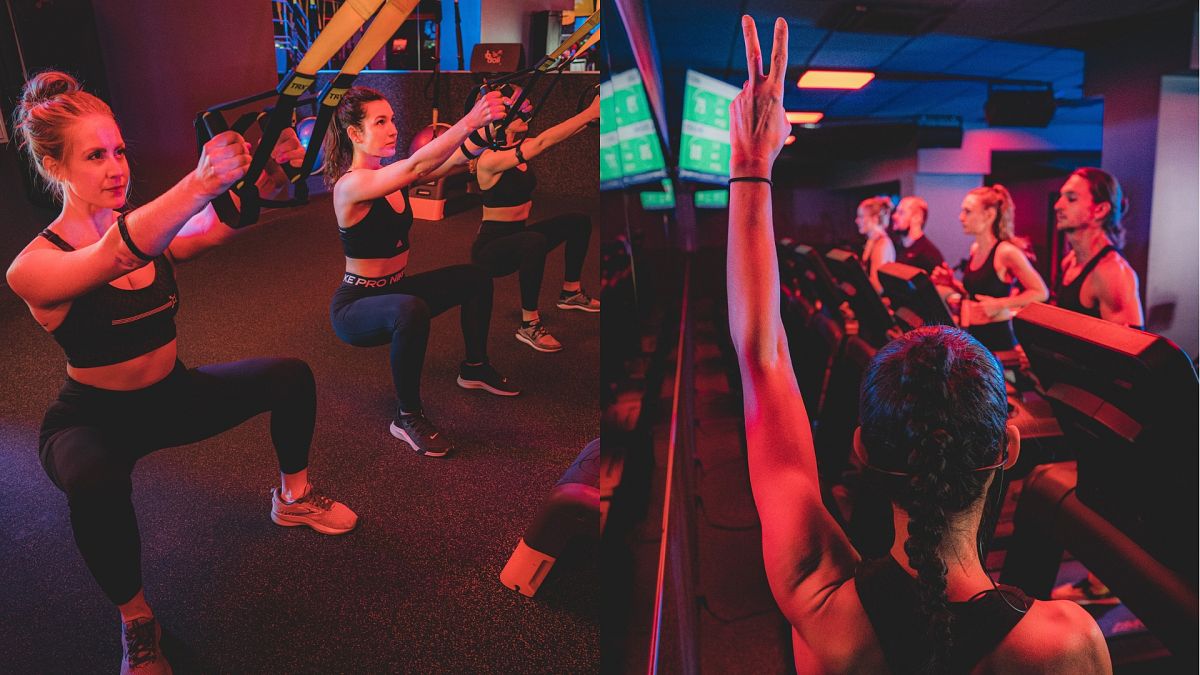The US exercise chain Orangetheory Fitness has expanded to several European countries, using its data-driven philosophy to cater to fitness junkies.
Between wearable tech like Fitbits and Apple Watches and popular fitness apps like Strava and MyFitnessPal, fitness has never been so connected.
Data nerds can track their steps, their heart rate, their calorie intake and a long list of different exercises. That means the days of one-size-fits-all workouts are long gone.
One of the early adopters of this personalised fitness model was the US exercise chain Orangetheory Fitness.
The studio was launched in 2010 in Florida by physiologist and trainer Ellen Latham, who designed the programme based on her knowledge of exercise science.
Orangetheory Fitness (OTF) has now become an international phenomenon, with a loyal following of nearly one million members, according to its website.
In recent years, the US brand has made its way overseas, with studios in major cities in the UK, France, Germany, Spain, Denmark and Poland.
How it works
The concept revolves entirely around group classes, with no “self-service” weight lifting or cardio areas like at other gyms. Each group workout lasts one hour, and participants wear a heart monitor throughout the class to track their beats per minute.
Classes are a combination of HIIT (high intensity interval training) and traditional cardio, featuring treadmills, rowing and floor exercises. HIIT alternates short bursts of high-intensity exercises with recovery periods and research has shown it can help you burn more calories in shorter periods of time.
The “orange” in Orangetheory comes from the idea that users need to spend at least 12 minutes in the orange heart rate zone (which means their heart is beating at 84-91 per cent of its max capacity). The “theory” behind it is that doing so will boost their metabolism while burning fat and calories – even after the workout ends.
It’s based on a scientific concept called EPOC – excess post-exercise oxygen consumption, which is a fancy way to describe your body’s natural “afterburn” following a sustained period of intense effort.
Orangetheory’s website claims that your body can keep burning calories up to 36 hours after a workout. But research suggests that the effects of afterburn only last about an hour.
While the science may be exaggerated, the results reported by members are often astounding.
“One of our members lost 20 kilos in less than a year,” said Linda Rivet, a coach at OTF’s Paris studio.
Rivet said new OTF members are given an assessment when they first arrive using a scanner called InBody, which measures body fat and muscle mass. These scans are repeated periodically to track their progress.
One point Rivet emphasised is that the studio adapts to each member’s goals, whether that’s losing weight, building muscle or improving overall fitness and endurance.
“Challenge and intensity are important, but it’s really adaptable to everyone, regardless of age, gender or fitness level,” she told Euronews Culture.
A global community
OTF workouts around the world are all based on the same building blocks, which means members who are visiting another country could theoretically stop by for a class at the local OTF and pick up where they left off at their home studio.
Rivet says that one of the pillars of the programme is building a community around exercise.
“It’s really the American model when it comes to community,” Rivet said. “Members support each other during classes and outside the studio they spend time together, organising events.”
Rivet said that in her 10 years as a fitness coach in France she’s never felt a community quite as strong as OTF. Recently, she’s noticed more and more Parisians are yearning for this kind of human connection through sport.
“Orangetheory classes tend to become addictive,” she said. “A lot of people start with one class, then two and then they’re coming every day because the sense of community is so strong and they really feel supported by other members. I feel like, particularly in Paris, people really miss this kind of human connection and mutual aid.”
The science backs her up. Studies have shown that group exercise classes have unique benefits that individual workouts lack, improving emotional and mental health on top of physical fitness.
How much does it cost?
One of the main criticisms OTF receives is the cost, which for many can be prohibitive.
Each location sets its own pricing – Women’s Health reported that the Islington branch in London charges £30 for the first three classes, £119 for an 8-class per month package and £149 for unlimited classes.
Paris studio manager Nicolas Nechitch told Euronews Culture classes there cost €10-35, with lower prices for members who attend more classes per month.
The OTBeat heart monitor, which is designed by OTF and required so members can see their stats appear on screen during classes, also costs a pretty penny – $119 on the Orangetheory online shop.
But for many OTF die-hards, the results are worth it. On the r/OrangeTheory Reddit page, which has 204,000 subscribers, some users said they took on side hustles to pay for their membership.
Others suggested using the knowledge gained from OTF to continue working out on your own if the price becomes too steep to continue.
“The money is significant. Rent is more important. Make appointments with yourself to workout and use the intel here when you need inspiration,” wrote user “Own-Safe-4683”.
In spite of the costs, the Orangetheory concept has caught on with fitness junkies the world over, who see it as a great data-driven workout. In Paris, three new studios are expected to open by the end of 2023.

